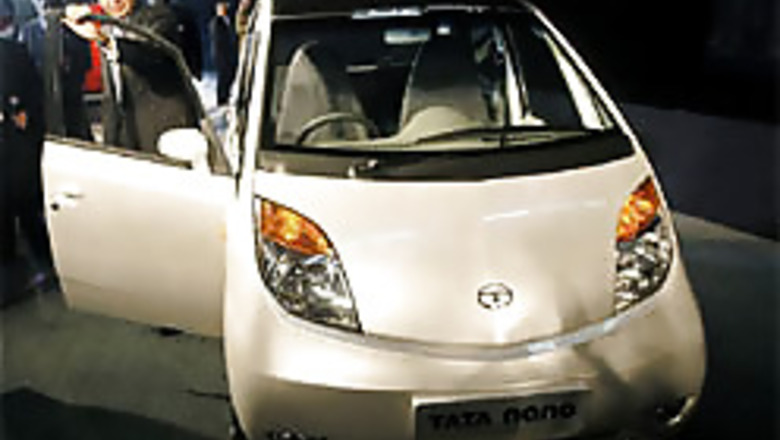
views
New Delhi: Praise for Tata Motors' low-cost Nano car has been as much for its style and engineering as for its "world's cheapest" price tag, signalling India's intent to be more than just a cut-price manufacturer.
Analysts say India's reputation as a world-class information technology provider will help in that drive, but cost constraints and a growing shortage of skilled manpower may be roadblocks.
Tata unveiled the Nano on Thursday amid feverish media coverage, and said the curvy but compact car would carry a dealer's price of $2,500, affordable, it hopes, for millions of poorer customers in emerging markets. (see pics)
India's engineering potential is "underestimated" by global auto firms, said consultancy KPMG, which says automotive services make up only a fifth of total engineering services revenue of $1.5 billion from global outsourcing.
"The auto industry competes for the same talent, but it is not as glamorous, and the pay is not as good," said Yezdi Nagporewalla, its national director for industrial markets.
Indian motorbike firms and components makers, whose exports are forecast to hit $20-$25 billion by 2015, have a longer history of developing innovative design and technology to be more competitive, said an analyst at consultancy Frost & Sullivan.
"But barring the top auto firms, others have not invested sufficiently in design and development," said VG Ramakrishnan, director of its automotive and transportation practice.
Tata Motors built its first car, the Indica hatchback, indigenously, as did Mahindra & Mahindra Ltd, whose sport utility Scorpio is being exported. They have bought European and US engineering firms, and are also developing products with foreign venture partners.
Chairman Ratan Tata said on Thursday the design and development of the Nano was done entirely in-house. "India is a low-cost manufacturing centre, but we also have engineering skills that make these ambitions possible," he said.
PAGE_BREAK
At the same time, global firms such as Suzuki Motor, General Motors Corp, Renault and Hyundai Motor have set up design and engineering centres in India.
Frugal Engineering
Suzuki Motor, which unveiled its concept A-Star, a new model aimed at global markets, at the same Auto Expo, is building its largest R&D centre outside Japan in India and has said its India team would have a major role in developing other models for the world market. Carlos Ghosn, head of Renault, has praised the "frugal" engineering mindset of Indian manufacturers, and is studying the feasibility of a $3,000 car with India's Bajaj Auto.
It already makes the no-frills Logan sedan in India with Mahindra. Other firms are eyeing similar opportunities as the demand for low-cost and "green" fuel-efficient vehicles grows.
"You need to build products and systems on the ground with local skills and with partners that have local knowledge," said Karl-Thomas Neumann, member of the executive board of German parts maker Continental. Technical labour in India costs just a fraction of what it does in Europe or the United States, and India can derive greater benefits from developing its technical prowess as competition erodes its cost benefit in manufacturing, Nagporewalla said.
It also has an edge over China, which has had problems with quality and the protection of intellectual property.
"Business relationships in China can be tricky," said Stefan Pierer, chief executive and chairman, KTM, whose venture partner Bajaj is developing two new motorbike platforms.
"Indian firms have a philosophy of long-term relationships."
But others lament the lack of scale and resources. "We are still concentrating on keeping costs low in manufacturing," said Pankaj Mital, chief operating officer of Motherson Sumi Systems Ltd.
"Research and development needs billion of dollars."
















Comments
0 comment